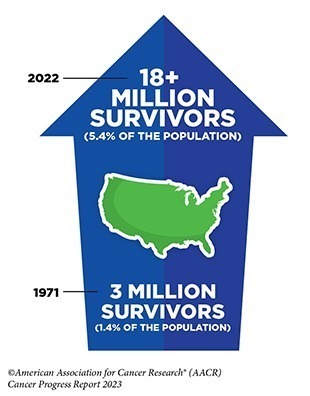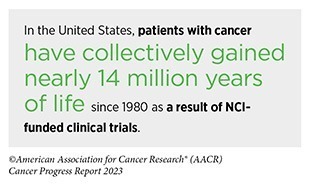Unprecedented progress in medical research is increasing our understanding of the collection of diseases we call cancer and is driving remarkable improvements in cancer prevention, early detection, diagnosis, and treatment. These advances are made possible by investments in NIH, NCI, FDA, and CDC by the U.S. federal government.
As the first and largest professional organization in the world dedicated to preventing and curing all cancers, AACR has been and continues to be a catalyst for scientific breakthroughs that save and enhance the lives of patients with cancer. AACR is also committed to increasing public understanding of cancer and advocating for increased federal funding for medical research.
The annual AACR Cancer Progress Report to Congress and the American public is a cornerstone of AACR’s educational efforts. This thirteenth edition of the report highlights how research continues to extend and improve the lives of Americans, including the lives of the eight courageous individuals featured in the report and their family members who have shared their experiences with cancer. It also underscores how unwavering, bipartisan support from Congress, in the form of robust and sustained annual increases in funding for NIH, NCI, FDA, and CDC, is urgently needed if we are to realize our vision of eradicating cancer for all populations.
CANCER IN 2023
The remarkable progress being made against cancer is resulting in a steady reduction in cancer death rates, and a consistent rise in the number of people who live longer and fuller lives after a cancer diagnosis. In fact, the overall U.S. cancer death rate has fallen by 33 percent between 1991 and 2020, a reduction that translates into averting an estimated 3.8 million deaths from cancer. The reduction in overall cancer mortality is driven largely by the decline in the U.S. lung cancer death rate, the pace of which has accelerated in recent years because of reduction in smoking and advances in early detection and treatment. Additionally, the reduction in death rates for melanoma, colorectal cancer, prostate cancer, and female breast cancer has contributed to the progress against overall U.S. cancer mortality. Notably, among U.S. children (14 years or younger) and adolescents (15 to 19 years), overall cancer death rates have declined by 70 percent and 64 percent, respectively, over the past five decades, driven largely by improvements in treatment.
Despite significant advances, cancer continues to be an ongoing public health challenge in the United States and around the world. In the United States alone, it is estimated that nearly 2 million new cancer cases will be diagnosed in 2023. Among the challenges we face is the fact that the advances we have made have not been uniform for all types and stages of cancer. For example, while the death rates for many of the commonly diagnosed cancers in the United States—including breast, lung, and prostate cancer—have been declining, those for other forms of cancer—most notably pancreatic and uterine cancer—have been increasing. Moreover, the burden of cancer is shouldered disproportionately by certain segments of the population, including racial and ethnic minorities and patients from other medically underserved populations. These disparities are driven by complex and interrelated factors, called social determinants of health.
The burden of cancer and its economic toll, both on individuals and on the U.S. health care system, are expected to rise in the coming decades, underscoring the urgent need for more research to accelerate the pace of progress against cancer. The progress highlighted in this report was made as a direct result of the cumulative efforts of individuals working across the spectrum of medical research and the support from the federal government.
. Public sector funding from NIH and NCI directly contributes to patient benefit such as through the development of lifesaving anticancer therapeutics. Continued federal investments in NIH, NCI, FDA, and CDC will help the medical research community maintain the momentum of scientific and technological innovation, accelerate the pace of progress against cancer, and ensure that we achieve the President’s Cancer Moonshot goal of reducing U.S. cancer death rates by 50 percent by the year 2047.
Published in GI-Mail 11/2023 (English edition).
- Do you already know our monthly newsletter GI-Mail with useful tips on postgraduate courses?
Sign up here. - Are you looking for vacancies or new career challenges? Here you will find the latest vacancies and job offers.
- Do you already know our monthly job-information GI-Jobs with current job offers for doctors, managers and nurses? Sign up here.
- Are you interested in up to date postgraduate courses and CME? In our education database »medicine & health« you will find new education events from over 2300 organizers.



